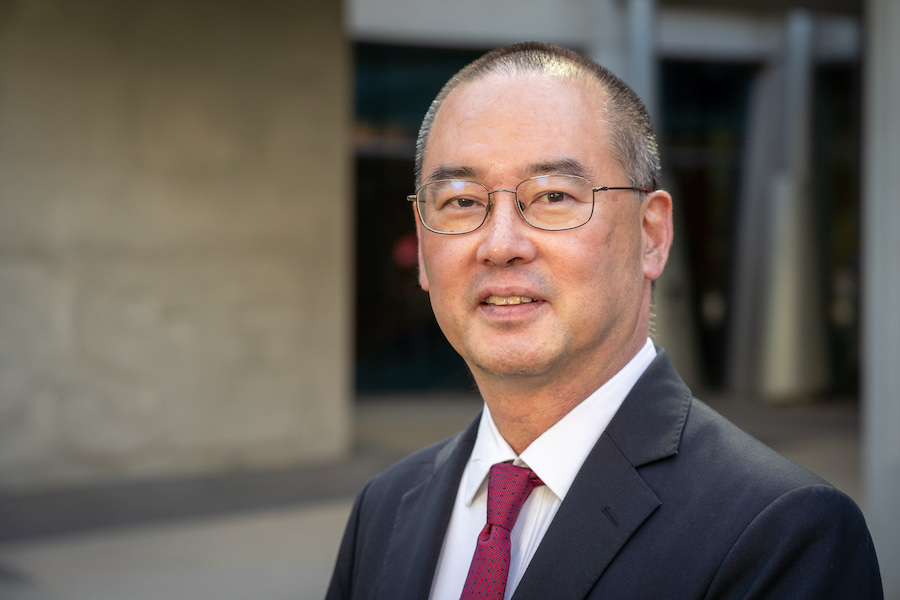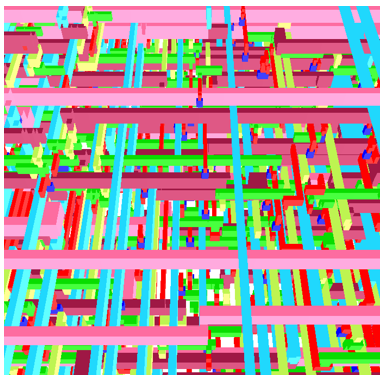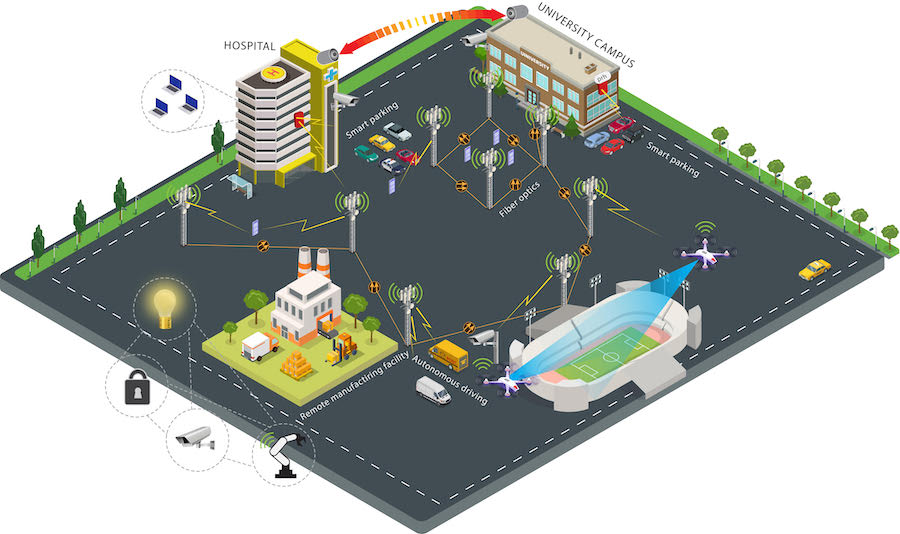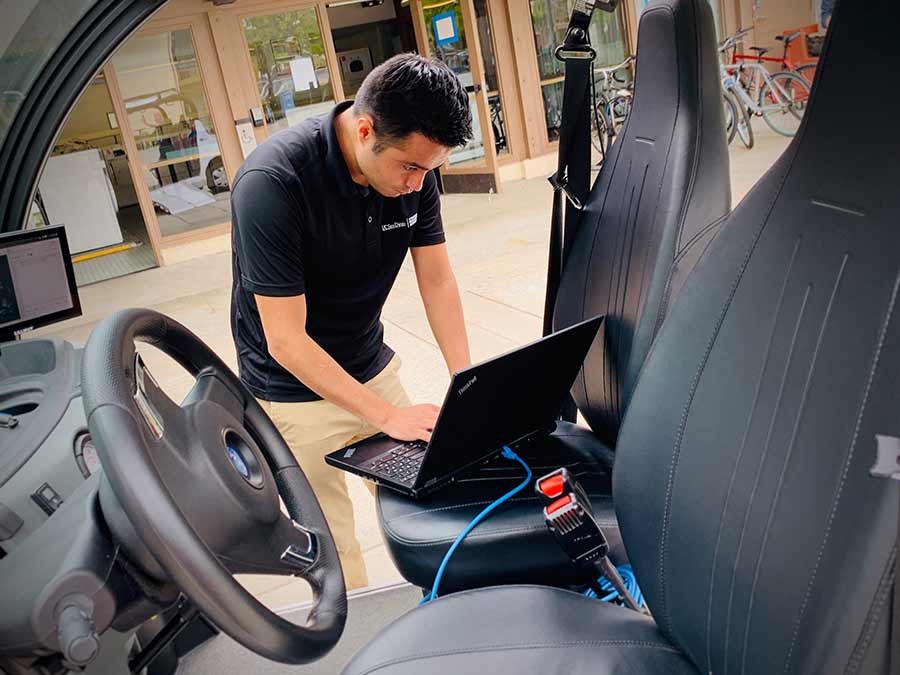
NSF Invests $20M in UC San Diego-headquartered Artificial Intelligence (AI) Research Institute
By:
- Ioana Patringenaru
Published Date
By:
- Ioana Patringenaru
Share This:
Article Content
Faster computer chip design. Wireless networks with greater energy efficiency. Self-driving cars that interact better with pedestrians and with one another. These are among the advances expected to emerge from a new institute led by the University of California San Diego that is focused on Artificial Intelligence (AI) and optimization. The Institute for Learning-enabled Optimization at Scale, or TILOS, is funded by a $20 million grant from the National Science Foundation. The Institute will be housed at the Halıcıoğlu Data Science Institute (HDSI), UC San Diego's campus hub for data science and artificial intelligence.
TILOS is part of NSF’s National AI Research Institutes 2021 funding, a five-year, $220 million investment to create 11 multidisciplinary, multi-institution research institutes to serve as national hubs for universities, federal agencies, industry, and nonprofit organizations to advance AI research and workforce development. The UC San Diego institute is also supported by Intel.
"As a global society, we can't afford to allow advances in optimization to be underutilized," said UC San Diego Chancellor Pradeep K. Khosla. "The TILOS team is made of an incredible combination of engineers, computer scientists, data scientists and educators who will tackle the hardest theoretical and applied challenges in optimization through virtuous feedback loops that ensure the advances will make a positive difference in the real world."
In addition to UC San Diego, TILOS includes the Massachusetts Institute of Technology; San Diego-based National University; the University of Pennsylvania; the University of Texas at Austin; and Yale University.

Andrew B. Kahng, a professor of computer science and electrical engineering at UC San Diego, is the principal investigator of The Institute for Learning-enabled Optimization at Scale.
TILOS is led by Andrew Kahng, a world-renowned expert in the field of chip design and professor of computer science and electrical engineering at UC San Diego. “Optimization is a universal quest, reflecting a universal need to do better,” said Kahng. “Improved optimizations of energy-efficiency, safety, robustness, and other criteria in engineered systems would bring incalculable societal benefits. But fundamental challenges of scale and complexity have kept many real-world optimization needs beyond our reach.”
Optimization is a fundamental component of machine learning, an important area of modern AI. Conversely, machine learning can help solve difficult optimization problems. In close collaboration with industry partners, TILOS researchers will develop learning-enabled optimization tools for application areas of strategic importance to the United States, including chip design, robotics, and communication networks.
"Optimization is both a science and a technology,” said Rajesh K. Gupta, founding director of HDSI, UC San Diego’s data science hub, which will house TILOS. “This new AI institute will not only discover new science at the interface of AI and optimization, but also deliver it to real-world practitioners as a technology: measuring it to improve it, with benchmarking and a roadmap of progress.”
UC San Diego professor Yusu Wang, an expert on topological and geometric data analysis at HDSI, will serve as associate director for research for TILOS, leading the effort that brings together foundational and applied research.
“Optimization problems are ubiquitous, affecting so many sectors in society,” said Wang. "HDSI plays a key role in TILOS by contributing broad expertise from data science and machine learning, and connecting this expertise to both theory of optimization as well as applied domains."

Researchers on TILOS's foundations team will tackle challenges in the advancement of AI. One of them is to be able to learn in the presence of stochastic or adversarial agents. This requires nonconvex optimization.
Foundations research
The TILOS foundations team aims to discover key principles and new methods in the interplay of AI and optimization. The team is composed of leading researchers with expertise in optimization, machine learning, and algorithms. It is co-led by Arya Mazumdar, an associate professor at HDSI who studies error correcting codes, information theory and statistical learning theory. As an institute, TILOS emphasizes working partnerships between the foundations team and the applications experts in chip design, robotics and networking. Each of the TILOS application areas produces rich, complex datasets that challenge research on foundations to stretch the boundaries of AI-enabled optimization. They are also areas where improvements could make a dramatic impact on everyday life.
"Our team works on unveiling the most fundamental mathematical questions related to optimization and learning," said Mazumdar. "These range from demystifying the success of deep neural networks to finding limits of distributed optimization methods."
Chip design

Zoomed-in view of routed wires in a tiny fragment of an advanced-technology chip design produced by the UCSD-led "OpenROAD" project. An entire chip layout will consist of many thousands of such fragments, and simultaneously optimize for speed, energy-efficiency, reliability, security, cost and many other goals.
In addition to serving as TILOS director, Kahng will co-lead TILOS’s research in the chip design domain. For over 15 years, he led the roadmap for chip design as part of the semiconductor industry’s technology roadmap. He recently authored a commentary in Nature in which he noted benefits that AI could bring to chip design, such as dramatic speedups of the design process that would increase quality, productivity, and innovation.
Communication networks

Optimizing the design and operation of networks will not only enable new capabilities in autonomous driving, augmented and virtual reality for telemedicine, and robotics, but will also result in tremendous energy savings to help combat climate change.
Tara Javidi, a professor in the UC San Diego Department of Electrical and Computer Engineering, will co-lead TILOS’s efforts to apply optimization breakthroughs to network research. One of the areas where advances in AI and optimization can make positive impacts is energy efficiency of digital networks.
Today, communication networks, for example, consume 200 to 300 Terawatt-hours globally per year, 10 times as much as what is produced by the United States’ most powerful nuclear reactor. A significant amount of this energy consumption is due to the suboptimal design and allocation of extra supplies to make up for lack of reliability.
“Our demand for data and reliable connectivity is exponentially growing, and sustainable scalability of our modern information infrastructure is at stake,” Javidi said. “Optimizing the design and operation of networks will not only enable new capabilities in autonomous driving, augmented and virtual reality for telemedicine, and robotics, but will also result in tremendous energy savings to help combat climate change,” she added.
Robotics

Computer science graduate student David Paz-Ruiz checks code during a mail delivery run with a self-driving cart on the UC San Diego campus..
The TILOS robotics thrust will be co-led by computer science professor Henrik Christensen, director of the UC San Diego Contextual Robotics Institute. Christensen is the editor of the US Robotics Roadmap. AI-driven optimization will allow robots to better perceive their environment and interact with them in a robust manner. It will also lead to robots that learn faster, from fewer examples.
This could result in self-driving cars that are better able to interact with other vehicles and people on the road. It will also bring about robots that are better able to interact with humans, in the home and in public spaces.
“We have an interesting bouquet of problems we need to solve,” Christensen said. “And optimization is key to finding the solution.”
Education and workforce development
TILOS research will engage graduate students and post-doctoral researchers at every step of the way.
"It is critical that we provide students studying and working at the interface of theory and practice with access to the toughest real-world challenges," said Albert P. Pisano, Dean of the UC San Diego Jacobs School of Engineering. "TILOS research will be simultaneously fundamental and applied -- and always with impact in mind. This type of research environment will give students here and across the nation exceptional opportunities to grow, as technologists and as citizens."
In addition, the TILOS team has planned a broad program for workforce development outside the lab, which will identify and teach new practical skills and mindsets that emerge from fundamental and applied advances in optimization. The team is building an openly accessible program of continuing education with long-term, lifelong learning and skills renewal as its central tenet.
Broadening participation
TILOS programming will extend beyond the classroom, with embodied robot demonstrations, community art installations, and portable, adaptable “outreach in a box” modules to engage and excite a next generation of learners. These initiatives aim to grow awareness of, and access to, new career and educational opportunities -- especially among students and others who are traditionally underrepresented in engineering.
“Many meaningful and rewarding career opportunities will emerge at the nexus of AI, optimization, and application domains,” said Kahng. “In keeping with its position as a National AI Research Institute, TILOS brings a truly exceptional, inclusive and diverse team to pursue basic research; translate results into industrial practice; train the future workforce; and bring awareness of the broader educational and job opportunities that result from advances in AI and optimization."
UC San Diego members of the TILOS team
Nikolay Atanasov, Mikhail Belkin, Henrik Christensen, Fan Chung Graham, Sicun Gao, Tara Javidi, Andrew Kahng, Farinaz Koushanfar, Melvin Leok, Yian Ma, Arya Mazumdar, Saura Naderi, Michael Pazzani, Tajana Rosing, Hao Su, Xiaolong Wang, and Yusu Wang.
The full team listing is available on the TILOS website.
Share This:
You May Also Like
Stay in the Know
Keep up with all the latest from UC San Diego. Subscribe to the newsletter today.


